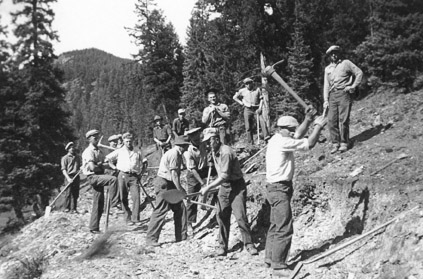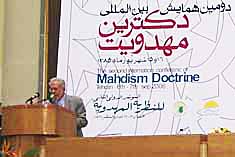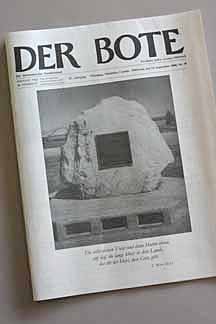Canadian Mennonite
Volume 10, No. 19
October 2, 2006

Conference to examine World War II CO experience
Winnipeg
 |
Nearly 30 years ago, Billy Graham was quoted in Sojourners magazine as saying, “I have 14 grandchildren now, and I ask myself, ‘What kind of world are they going to face?’… I have gone back to the Bible to restudy what it says about the responsibilities we have as peacemakers. I have seen that we must seek the good of the whole human race, and not just of any one nation or race.”
During the Second World War, more than 10,000 Canadians sought alternatives to military service. Their story remains virtually untold, having been largely relegated to short print-run books and contributions to archival collections.
After four years of planning, the War and the Conscientious Objector conference will be held from Oct. 20 to 21 at the University of Winnipeg, highlighting the experiences of Canadian conscientious objectors (COs) in the Second World War.
The COs came from all walks of life, with the largest numbers coming from groups such as Mennonites, Doukhobors, Quakers, Hutterites and Jehovah’s Witnesses. These people were called to military service but refused to participate. Instead, they sought options for alternative service through a program negotiated with the Canadian federal government.
Manitoba
More than 3,000 men claimed CO status in Manitoba, more than any other province. They worked in hospitals, farms, in Riding Mountain National Park, various industries, and in other provinces.
John Bergen was a teacher in Homewood. In a letter to the Department of Education in 1943 he declared himself a conscientious objector, stating, “We are willing to help to sustain life, rather than to help to destroy life, believing in Christ’s words, ‘Love thine enemy,’ as well as ‘Love thy neighbour.’”
After a hearing, Bergen’s teaching certificate was unanimously revoked. He then voluntarily served as a CO in the dental corps.
In 1946, Bergen’s teaching certificate was reinstated and he went on to a long teaching career, including 22 years at the University of Alberta. However, this issue did not rest with him. In 1975, Bergen revisited the issue with the education department.
After a review, the Manitoba Department of Education wrote, “In view of the fact that Mr. Bergen did serve his country during the war, that society’s attitudes have changed vastly in the last 30 years, and that Mr. Bergen’s record as a certified teacher was impeccable, I wish to recommend to you that the cancellation of Mr. Bergen’s certificate be expunged from the record and that retroactively he be considered certified during the period of cancellation.”
Alberta
In Alberta, 1,100 COs served on farms, in industry, mines and in 10 park locations for 50 cents a day, with the rest of their wages going to the Red Cross.
Samuel Martin was a CO from Duchess; he was called to military service in 1944. In his hearing, Martin was surprised when he was denied this status. Because he refused military service, he was arrested and spent more than 18 months in prison.
At times he was put in solitary confinement on a bread and water diet. In a cold cell, where the heat had been turned off and a window propped open, he only had his underwear to keep him warm because he refused to wear a military uniform.
David Goerzen and Henry Martens worked at Patricia Lake in Jasper National Park. Little did they know that they were working on a secret military project of the Canadian, American and British governments known as Habakkuk. This clandestine project had COs building a prototype warship made of ice that could withstand any enemy fire. Goerzen and Martens, of Abbotsford, B.C., have been extensively interviewed by Eco-Nova for an upcoming TV documentary, Ship of Ice, on the Habakkuk project.
Ontario
Ontario had more than 2,600 conscientious objectors, many of whom worked on farms. Others worked in industry, mines and parks, and fighting forest fires.
Wilson Hunsberger grew up in Waterloo, attending Erb St. Mennonite Church. As a school teacher, Hunsberger was chosen in 1943 to teach six Japanese children from three families in Nays, Ont. The children and their families were forced out of Vancouver and sent to Nays because they were seen as a threat to national security.
Saskatchewan
There were more than 2,300 men registered as COs in Saskatchewan, working in hospitals, farms, lumber camps, as firefighters and as medics.
Don Regier of Tiefengrund worked on the J.S. Palmer and Sons farm near Marsden. Palmer had been on the board that interviewed Regier and gave him his CO status. While most COs received 50 cents a day for their work, Palmer paid Regier a full wage in addition to the money sent to the Red Cross.
British Columbia
There were more than 20 locations in B.C. where COs were sent from across the country to complete their alternative service. From B.C. alone there were more than 1,600 COs.
One of their jobs was to plant trees—17 million of them—which today are worth over $1.7 billion.
“[The CO workers] have served a function of great national importance and will continue to do so in these camps. The need is as urgent as ever and they cannot be replaced,” wrote Minister A. Wells Gray to Justice A.M. Manson during the war years.
Conference highlights
The War and the Conscientious Objector conference will take a critical look at the experiences of Canadian COs such as Martin, Goerzen and Martens in the Second World War and interpret them in today’s context. The conference will feature speakers from a wide variety of backgrounds, including experts on pacifism in Canada, university students, peace activists and Second World War COs themselves.
For more information on conscientious objectors and the conference, visit alternativeservice.ca and follow the “CO conference” link.
Mennonite scholars participate in Muslim doctrine conference
Tehran, Iran
 |
With much international attention to Iran’s policies and influence in the wider region of the Middle East, some observers are also taking note of religious dynamics. In September, three Mennonite scholars participated in a conference in Tehran devoted to study the “science of messianism,” also known in Shi’a Islam as the “Mahdism doctrine.” The Bright Future Institute, in Qom, Iran, organized and hosted the conference.
The conference drew more than 100 international participants—including David W. Shenk, global consultant with Eastern Mennonite Missions, Salunga, Pa.; Thomas N. Finger, independent scholar at Reba Place Church, Evanston, Ill.; and N. Gerald Shenk, professor of church and society at Eastern Mennonite Seminary, Harrisonburg, Va.—and an estimated 4,000 Iranians.
The figure of the Mahdi in Shi’a Islam is identified as the Twelfth Imam in succession after the prophet Mohammed. In Mahdist doctrine, after a lengthy period of injustice and immorality, he is expected to return to establish justice and restore righteousness on Earth. Allusions to Christian teaching are frequent, and in some versions the return of Jesus Christ and the expected Mahdi figure are linked. A display in the conference lobby prominently looped a video proclaiming: “Do you know—Jesus Christ is coming soon? And the Mahdi comes right after that!”
David Shenk presented a paper on “Messianic hope in biblical eschatology” to a plenary session, drawing on his lengthy acquaintance with Islam in Africa and around the world. He began with a reference to Iranian President Ahmadinejad’s recent letter to U.S. President Bush (May 8), which named this hope for the second coming of the Messiah.
Shenk’s paper and another presented by Tom Finger carefully outlined the characteristics of human society that is marked by God’s rule, expressed in the life of the early followers of Jesus, as non-violence, equality and economic sharing. Shenk further stated that Jesus the Messiah is the fullness of the presence of the kingdom of God.
Gerald Shenk’s paper discussed the rise of messianic movements in the American context during the past two centuries. He also traced the same beliefs into movements of dispensationalist theology, which account for support by many contemporary Christians for the nation of Israel both before and after 1948.
Professor Muhammad Legenhausen of the Imam Khomeini Education and Research Institute in Qom, commented on the significance of having Christian views presented within a religious conference in Iran. “To have a Christian voice present without being antagonistic is tremendous,” he said.
In response, Gerald Shenk said, “In the context of heightened international tensions, the courtesy extended across historic religious divides to welcome the witness of Christian scholars in the framework of new thinking about Islamic hopes and expectations was remarkable.”
Der Bote to cease publication in 2008
Winnipeg
 |
As one of only three remaining German language Mennonite periodicals in North America, Der Bote will celebrate 84 years of publication and wind down its ministry in June 2008.
For a number of years the editorial staff of Der Bote have been aware that one day the magazine would cease publication. The number of subscribers has decreased steadily and, although it has enjoyed strong financial support from readers, its operation has been subsidized increasingly through a special Der Bote reserve fund. In the mid-1970s Der Bote enjoyed a high of more than 9,000 subscribers. Today, just 2,350 subscribe.
In April 2006, the Der Bote Editorial Committee, along with editor Ingrid Janzen Lamp and Dave Bergen, executive secretary for Mennonite Church Canada Christian Formation, met to consider the future of the paper. They eventually reached the decision to bring publication to a close.
“The declining number of subscribers, along with the reality of shrinking funds, led us to the conclusion that Der Bote cannot sustain itself beyond June 2008,” stated Bergen.
Lamp added, “We are grateful for the many people whose gifts, hard work and dedicated prayers have made it possible to continue this ministry for so long.”
Various ways of continuing to nurture Der Bote readers beyond 2008 are being explored.
During the final year of publication, the ministry of Der Bote will be celebrated in a series of feature articles highlighting the impact of its ministry over the years. Also, a special Der Bote celebration is planned during the 2008 assembly of MC Canada.
Founded in 1924 as Der Mennonitische Immigrantenbote in Rosthern, Sask., it later merged with the U.S.-based Christlicher Bundesbote in 1947 and became the weekly publication of the former General Conference Mennonite Church as Der Bote. Since the transformation into MC Canada in 2000, Der Bote has been a resource ministry of the national church. Over the years, the bi-weekly paper has provided important news, information and spiritual nurture to readers in Canada, as well as the United States, Mexico, South America and Europe.